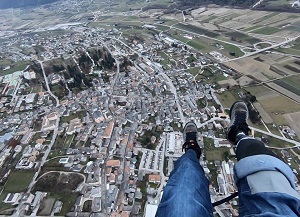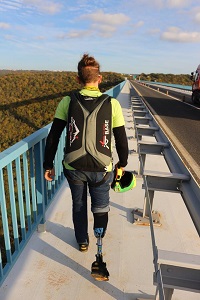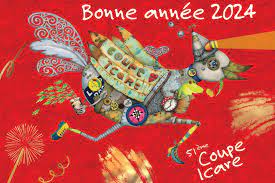You have to face the problem
- an interview with Maurizio Menta after an air accident
Data publikacji : 12.04.2019
We are already been bombarded by the advertisements of courses everywhere that will teach us how to live after an accident. However, can we only rely on an expensive psychological therapy ?
Nowadays, only money talks. Therefore, if we want to feel the joy of life again, We should talk about our accident other pilots, we can help paragliders sort their own approach to the risk. I invite you to read the interview with Maurizio Menta - an extremely inspiring person, on which example we are happy to write that air accidents do not have to take away the will to live. Let's take a glance at how the 35-year-old authentic passionate sports enthusiast (paragliding, skydiving) and mountain climbing, skiing dealt with the fall.
In 2015, Maurizio, an Italian entrepreneur, an owner of Uva e Menta restaurant, fell from a high - altitude while practicing speedflying. As a result of the accident, two feet, three vertebrae, eight ribs and a breastbone broke. After a month of coma as well as months spent being hopsitilized without moving in bed, Mauzizio underwent surgery to amputate the foot. He found Love in the hospital. He has never given up on his plesures. Free aviation is still his passion.


Photo is owned by Maurizio Menta photog - Maurizio di Palma e cristian benedini
Agnieszka Chmielewska : When was the first time you have realized that there was no chance to save your leg ?
Maurizio Menta : After a couple of minutes after the accident, in a moment of brightness right after the accident.
A.Ch : How long have you been staying in the hospital ?
M. M. : About 8 months before getting up from bed.
A.Ch. : What do you usually feel when people see you after an accident ?
M. M. : To me it is normal, I feel like before the accident.
A.Ch. : You have gone through weeks of ardrous exercices. What does your typical day of rehabilitation look like? How long does rehabilitation last? In addition to the rehabilitation activities you are attending, do you still go on rehabilitation batches ?
M. M. : I had 4 months of rehabilitation in the hospital. After 3 years of discontinuing / home made exercises I still working to get the previous health conditions.
A.Ch. : What were your emotions like when you found out about your disability ?
M. M. : I was focus on getting better, but I did not feel any anger.
A.Ch. : Who is your psychological support after the accident ?
M. M. : Close friends, close family and relatives.
A.Ch. : Could you rely on any kind of insurer's service after the accident ?
M. M. : Italian health public service is very efficient.
A.Ch. : Let's go back to the moment of the accident. Do you remember how it came to a fall while doing sports ?
M. M. : Yes, I have very clear memories about the accident supported by the GoPro recording.
Link to accident : Filmato Incidente
By the way, I was present the whole time during the event and the transfer to the hospital, thus the dinamic of the accident is very clear to me.
The accident happened on the 22nd of October ( about 10:30 a'clock a.m. )
A.Ch. : In this situation, can we talk about the progress in recovering your fitness ?
M. M. : I am training almost every day with rehabilitation exercise and different sports like biking, trekking, paragliding and skiing.
A.Ch. : What is the biggest problem on the way to recovery now ?
M. M. : I miss my leg… to be honest just a third…
A.Ch. : Can you tell when did you start your adventure with paragliding or other air sport ? What were your beginnings in this sport ? When and where did your first meeting with aviation take place ?
M. M. : It was summer 2014 in Italy beginning with paragliding and skydiving.
A.Ch. : Why did you choose this sport ? What made you interested in aerial sports ?
M. M. : I was annoyed by every day life, so I wanted to change with something more adrenalinic and complex.
A.Ch. : I will ask a question that many people will certainly think of : how can the people with a resultant long term accident effect be able to paraglide or do other air sports ?
M. M. : You have to face the problem.
A.Ch. : The disabled are often locked in the four walls of their own home, not socializing any more . How can they break this passivity ?
M. M. : If you don’t socialize and interact with other people and every day life the only other option is to give it up and die… so you get up and socialize.
A.Ch. : Could you share your experience and knowledge of using a bionic prosthesis during paragliding and other aviation sports ?
M. M. : No one tell you when you are ready to face again these kind of sports. But once you are ready you will feel it. No rules stand to do it again. You have to be confident in your abilities, and clearly when you try the first time the difficulties are bigger. But you have to trust yourself and be aware of you abilities and limits.
A.Ch. : Do you think that the price of a prosthesis is expensive ?
M. M. : Fucking expensive !!!!
A.Ch. : Is the prosthesis insured ? For how long will the company guarantee the efficiency of the prosthesis ?
M. M. : Prothesis are not made for sport activities, and their life is dramatically compromise by the intensive usage. The health assistance service will provide the need for a normal life but not for sport intensive activity, so I do have to provide for it by myself.
A.Ch : Does the family support you in practicing sports and how ?
M. M. : Yes, but they are not happy me to practice it…right as before.
A.Ch. : What do you think about when practicing paragliding ?
M. M. : It’s fun. I feel very into something.
A.Ch. : What would you consider your greatest sports success as both a pilot and a trainer ?
M. M. : I am very passionate and I feel good with myself.
A.Ch. : Is it difficult to encourage people with disabilities to play sports ? What is the biggest difficulty in activating them ?
M. M. : It’s difficult, a lot of motivation is needed to activate yourself.
A.Ch. : Who are the people's guides after the accident? What skills should they have ? Where can you find them ?
M. M. : Physicians, fisiotherapists and friends with passion for sports.
A.Ch. : What could you advise people with disabilities, where they can look for support in undertaking sports activities ?
M. M. : I think the best support is within yourself and the people around them, close friends and relatives.
A.Ch. : What are your nearest plans for the future ?
M. M. : To get a normal life with lots of flying sports.
A.Ch. : How much time does it take to recover from an accident - overcome black thoughts, get a grip, start a new leaf of live ?
M. M. : I don’t think there is a time limit to fully recover the previous life. You try to do it every day.
A.Ch. : How much what you have gone through have shaped you internally, influenced your perception of the world, thinking ?
M. M. : I do not feel I have changed, even if the people around me let me think I have changed.
A.Ch. : Is there something that you would like to share with other disabled people to motivate them to act and add confidence in their own strength ?
M. M. : Do not stop !
A.Ch. : Does a tragic accident and the resulting disability have to be a turning point in the life of the person they have touched ? After such experiences, you could say how you can help in minimizing post-accident consequences, including financial consequences ?
M. M. : As a first suggestion, you should take what comes, accept it and try to face every situation at best of your possibility.
Perfect life does not exists (maybe only on Instagram).



